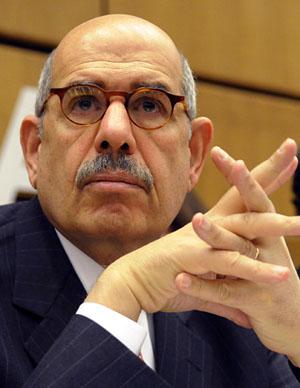Mohamed ElBaradei Hits Out at West’s Support for Repressive Regimes
Exclusive: Ex-nuclear chief says west must rethink Middle East policy as speculation grows he may run for office in Egypt

Western governments risk creating a new generation of Islamist extremists if they continue to support repressive regimes in the Middle East, the former head of the UN nuclear watchdog, Mohamed ElBaradei, has told the Guardian.
In his first English-language interview since returning to Cairo in February, the Nobel peace prize-winner said the strategy of supporting authoritarian rulers in an effort to combat the threat of Islamic extremism had been a failure, with potentially disastrous consequences.
“There is a need for re-evaluation … the idea that the only alternative to authoritarian regimes is [Osama] Bin Laden and co is a fake one, yet continuation of current policies will make that prophecy come true,” he said. “I see increasing radicalisation in this area of the world, and I understand the reason. People feel repressed by their own governments, they feel unfairly treated by the outside world, they wake up in the morning and who do they see – they see people being shot and killed, all Muslims from Afghanistan, Iraq, Somalia, Sudan, Darfur.”
ElBaradei said he felt vindicated in his cautious approach while head of the International Atomic Energy Authority. He revealed that all his reports in the runup to the Iraq war were designed to be “immune from being abused” by governments. “I would hope that the lessons of Iraq, both in London and in the US, have started to sink in,” he said.
“Sure, there are dictators, but are you ready every time you want to get rid of a dictator to sacrifice a million innocent civilians? All the indications coming out of [the Chilcot inquiry] are that Iraq was not really about weapons of mass destruction but rather about regime change, and I keep asking the same question – where do you find this regime change in international law? And if it is a violation of international law, who is accountable for that?”
ElBaradei, who has emerged as a potential challenger to the three-decade rule of Egypt‘s president, Hosni Mubarak, said western governments must withdraw the unstinting support for autocrats who were seen to be a bulwark against extremism.
“Western policy towards this part of the world has been a total failure, in my view. It has not been based on dialogue, understanding, supporting civil society and empowering people, but rather it’s been based on supporting authoritarian systems as long as the oil keeps pumping.”
The 67-year-old added: “If you bet on individuals, instead of the people, you are going to fail. And western policy so far has been to bet on individuals, individuals who are not supported by their people and who are being discredited every day.”
The popularity in the Middle East of Iran’s president, Mahmoud Ahmadinejad, and the Hezbollah leader, Hassan Nasrallah, he said, should be seen as message to the west that its “policy is not reaching out to the people. The policy should be: ‘We care about you, we care about your welfare, we care about your human rights.'”
On his return to Egypt, ElBaradei was greeted at Cairo airport by more than 1,000 supporters, despite a ban on political gatherings. He has not yet announced whether he will stand in next year’s elections against Mubarak, a key US ally who has ruled the Arab world’s largest country for 28 years.
ElBaradei said western governments needed to open their eyes to the realities of Egypt’s “sham” democracy, or risk losing all credibility in the battle against extremism.
“The west talks a lot about elections in Iran, for example, but at least there were elections – yet where are the elections in the Arab world? If the west doesn’t talk about that, then how can it have any credibility?
“Only if you empower the liberals, if you empower the moderate socialists, if you empower all factions of society, only then will extremists be marginalised.”
George Bush made the spread of democracy in the Middle East the centrepiece of US foreign policy, but the Iraq invasion largely discredited the initiative in the region. In a landmark speech in Cairo last June Barack Obama appeared to back away from his predecessor’s aspirations.
“America does not presume to know what is best for everyone,” Obama said. “No system of government can or should be imposed upon one nation by any other.”
The speech was largely welcomed in the Arab world at the time as a retreat from the neoconservative agenda, but some democracy activistsvoiced concern that it heralded the US backing away from the cause of human rights in the region.
Current Egyptian law effectively prohibits independent candidates from getting their name on the ballot paper, which has fuelled ElBaradei’s demands for a “constitutional revolution” to make the poll free and fair. Analysts believe Mubarak, who is 81 and currently recovering from a gall bladder operation, is planning to engineer a succession of power to his youngest son, Gamal.
ElBaradei said he was not afraid of intimidation by Egypt’s vast security apparatus, but revealed that several foreign governments had expressed concern about his safety in the country, following recent reports of his followers being arrested and tortured by police.
Speaking at his home, he said: “I hear that from so many different governments, people coming to me and saying ‘you should be careful’. But I don’t want to go around with bodyguards … people who are extremely poor and deprived are coalescing around me in the streets saying ‘we need change’, and I want to listen.”

